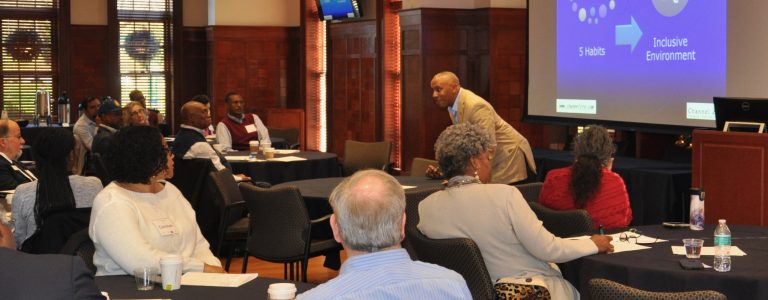
This toolkit provides materials and templates for implementing the AGEP-NC (Alliances for Graduate Education and the Professoriate – North Carolina) model of change to promote the success of Latino/a, Black and Indigenous American doctoral students in completing the degree and preparing for faculty roles.
Graduate program directors, department heads and deans will find example actions, sample language for policies, and videos of AGEP-NC community members discussing their experiences and how they approached the process of making change.
The section for faculty fellows includes checklists for conducting a study of how students move through their doctoral programs, as well as examples of sensemaking activities to engage their faculty colleagues and guidelines and examples of departmental plans that have been developed by other participating departments.
If you wish to adapt the AGEP-NC model to your own institution, the section titled “Tools for Administering the AGEP-NC Program” provides information about the AGEP-NC model of change, templates for recruiting and selecting faculty fellows, baseline data, example curricula for faculty fellows, and links to articles about different aspects of the AGEP-NC project. Survey instruments for assessing the practices and climate in doctoral programs are also provided in the last section of the toolkit. Finally, we offer a 7-hour workshop on adapting the AGEP-NC model to your institution.
Tools for Making Change
Tools for Deans
- Best Practices for Recruiting and Retaining Faculty of Color – This document is a compilation of ideas culled from departmental plans to recruit and retain diverse faculty.
- Video of Dean Jeff Braden, NC State College of Humanities and Social Sciences, discussing the effectiveness of departmental plans to recruit and retain diverse faculty.
- Video of Dean Braden charging a search committee, emphasizing the College commitment to diversity and providing insight into how unconscious bias plays out in faculty searches.
UNC Charlotte College of Computing and Informatics Vision and Mission
Video of Dean Fatma Mili discussing developing a College values statment
CCI Vision
A World with Equity in Computing and Humanity in Technology
CCI Mission
Guiding Principles
- We value intellectual curiosity at the service of scientific knowledge and sustainable progress
- We strive to understand and consider the ethical implications of our discipline
- We strive for equity of experience and outcome for all
Tools for Department Heads and Graduate Directors
- Biological Sciences, UNC Charlotte
- Biomedical Engineering, UNC Chapel Hill and NC State
- Marine, Earth and Atmospheric Sciences, NC State
Derek Aday, Head of the Department of Applied Ecology at NC State, discussing how his department engaged in debating approaches to enhancing the departmental climate.
Department of Applied Ecology, NC State
From AEC RPT RUL 05.67.23
2.7. In recognition of the central importance of diversity in our field, we consider the work of scholars and teachers to diversify science and science engagement to be as great a contribution (in the context of promotion and tenure) as research, teaching or extension. Examples of such efforts, which transcend the traditional categories of contribution, include a) mentoring students from underrepresented groups, b) scholarly work related to diversity and inclusivity, c) participation in, and especially leadership in, training focused on diversity in science and d) engagement and extension focused on underrepresented communities.
Department of Molecular and Structural Biochemistry, NC State
NC State University’s Department of Molecular and Structural Biochemistry includes these statements in their teaching, research, and service performance standards (https://policies.ncsu.edu/rule/rul-05-67-703/), respectively:
- Teaching Standards: “All faculty are expected to create and maintain an inclusive learning environment.”
- Research Standards: “Attracting graduate students into a specific research program, success of graduate students and other trainees, and establishment of an inclusive training culture are indications of the stature of an individual’s research program.”
- Service Standards: Evidence includes… “Extramural service including but not limited to science education in the community, fostering infrastructure development to support success of underrepresented minorities, and other outreach activities.”
DIVERSITY ACTIVITIES:
Please describe activities related to diversity, equity and inclusion at either the personal (off campus), department, college, or university level, or in the discipline.
Individual Development Plan (IDP) designed by AAAS for your Post Doctoral Career
An IDP from Boston University plus a number of useful resources students can use if they are unsure of their career path e.g. personality tests
- IDP for years 1-5 of doctoral studies from NC State Biochemistry
Introduction to Biological Research
Syllabus with links to all course materials: AEC502 Detailed Schedule Fall 2022
Topics:
- Tips on succeeding in graduate school
- Building your team – advisor, committee, your peers, and you!
- NCSU Library virtual tour of resources
- Developing research ideas and testable hypothesis
- Scientific writing
- Grant proposal writing
- Grant proposal review process
- Panel Review of Students’ NSF GRFP proposals
- Diversity, Equity and Inclusivity
- Science communication
- Publishing and reviewing manuscripts
- Safety and mentor-mentee communication
- SUNY College of Environmental Science and Forestry Expectations and Responsibilities for Faculty Mentors and Graduate Students
- North Carolina State University Document on Positive Graduate Education Culture
- NCSU Biological and Agricultural Engineering Department Best Practices in Graduate Education for Advisors and Advisees
Tools for Implementing the AGEP-NC Model at Your University
A short proceedings paper describing the AGEP-NC approach to promoting change, the project design, a schedule of activities for the first year, and lessons we learned in the first year of implementing the project:
An Institutional Transformation Model to Increase Minority STEM Doctoral Student Success .
NSF abstract of the project goals and activities
AGEP-NC Publications reporting on project implementation and outcomes.
Collecting baseline data on numbers of students who have completed the PhD program, who are still working on their degree and who left without completing the degree, by cohort and race/ethnicity, provides a reference for evaluating the effectiveness of your initiatives for promoting student success in degree completion. Data on the numbers of graduates who entered postdoctoral or faculty positions after graduation, the numbers of faculty hired and the numbers of faculty exiting by race and ethnicity are also important for tracking your progress.
This links to our library of readings and videos on the following topics:
- Mentoring
- Experiences of Minority Graduate Students
- Promoting Institutional Change
- Graduate Education and Diversity
- Diverse Perspectives
Adopting AGEP-NC Workshop
The AGEP-NC Leadership Team would be happy to come to your institution to present a full-day or half-day workshop on implementing the AGEP-NC Model. There is no charge for the workshop, except to buy lunch for the presenters.
This workshop is intended for institutions that might be interested in adopting the AGEP-NC model and trying this approach at their own institution. It can be tailored to your institution’s specific needs regarding topics covered and timing of the workshop sessions.
To request a Workshop, contact Marcia Gumpertz at gumpertz@ncsu.edu.
The AGEP-NC Leadership Team gave their first Adopting AGEP-NC Workshop on October 22, 2021 at the Georgia State University School of Public Health. The workshop consisted of a half-day opening in-person workshop followed by two 1.5-hour virtual sessions.
Day 1 (4 hours, in person)
- Overview of aims and approach
- Components of the AGEP-NC model of change, how we have implemented them in the North Carolina Alliance and toolkit for implementation
- Listening session to understand your institution’s goals and needs, assign several questions for consideration
Day 2 (1.5 hours, virtual)
- Review and discussion of goals and needs at your institution; panel discussion with AGEP-NC faculty fellows
Day 3 (1.5 hours, virtual)
- Surveys, mentoring results and mentor training
“We are very grateful for the time that the NC-AGEP consortium has spent sharing this mentoring model with us. During our workshop session we learned how the model has worked for them and were also able to begin to conceptualize how elements of the model might work for our School of Public Health. There was rich, thought-provoking discussion and I know I walked away excited to complete our homework and begin our next discussion on Nov. 9th. I see this model having elements of transformational change in how we conceptualize faculty and student mentoring.” — Kim Renee Ramsey White, Assistant Dean for Diversity, Equity and Inclusion, GSU School of Public Health.
Tools for Faculty Fellows
- Orient your colleagues to the AGEP-NC project and goals. An example slide deck for use in faculty meetings is provided in this section of the toolkit.
- Gather information about how students move through your doctoral programs and what difficulties they may be encountering. Two checklists for collecting this information are provided here.
- Survey faculty and doctoral students about the department’s practices and climate. The survey instruments are provided in the next section of this toolkit. Share the results with your department as a means to start departmental discussions about diversity in the graduate program. An example report is given in this section.
- Develop some activities to engage your faculty colleagues in learning about the issues facing doctoral students from underrepresented groups and about culturally responsive mentoring. These are called “Sensemaking” activities.
- Based on your findings from steps 2 and 3, work with your department head, graduate program director, and departmental diversity committee to draft a departmental plan with concrete steps for promoting the success of Black, Latino/a, and Indigenous American doctoral students in completing the degree and preparing for faculty roles. Guidelines and examples are provided here.
This is an example slide deck for introducing faculty colleagues, department heads, and others to the AGEP-NC project. Tailor it to your own circumstances.
Use these two checklists to collect information about how students move through your doctoral program and what difficulties they may encounter. The checklists also point to aspects of the program that might provide opportunities for change.
Surveys of department practices and climate can give a picture of the perceptions of doctoral students and faculty at the beginning of the change process and at the end. The AGEP-NC survey instruments are provided in the next section of the toolkit. In this section we provide an example report of survey results that may be used as a template. It is important to report the results to the faculty and students so that they know that their voices are being heard. Sharing this information in a faculty meeting can also be a good catalyst for discussion.
Guidelines for proposals for sensemaking initiatives
Example proposals for sensemaking initiatives
Department plans to promote the success of Black, Latino/a, and Indigenous American doctoral students in completing the PhD and preparing for faculty roles. These plans have been approved and adopted by AGEP-NC faculty fellows’ departments.
Survey Instruments and Information
When to administer: At the beginning and end of departmental participation in AGEP.
To whom: Department Faculty Fellows (those charged with leading the DEI initiatives in the department)
Administration: It is best for an outside consultant to administer and later clean the survey of any identifying information regarding the respondents. Due to the small number of Fellows generally participating, it may not be possible to avoid identifying them from their comments so extra caution must be used to prevent professional risk. Demographic information is not collected for this group.
Data sharing: The team of Fellows can use the information as a starting point for understanding landscape of diversity efforts in their departments and the progress they make over the time of their Fellowship.
When to administer: At the beginning and end of departmental participation in AGEP or any time a department wishes to understand how students perceive issues related to diversity in their graduate programs.
To whom: Doctoral students in a department
Administration: To maximize response rate and reduce respondent anxiety, it is best for an outside consultant to administer and later clean the survey of any identifying information regarding the respondents. Student comments may reveal the identity of the author which, if shared verbatim, could put the author at risk in their program. Demographic information should likewise be handled with the utmost respect for the respondents’ privacy and only collected and analyzed at the institution or very large sample size level where respondent identity can be protected.
Data sharing: The consultant can remove demographic data and share all other information with the department for deeper analysis. Data can be aggregated at the institution and alliance level for demographic analysis as well.
When to administer: At the beginning and end of departmental participation in AGEP or any time a department wishes to understand how faculty perceive issues related to diversity in their graduate programs and faculty culture.
To whom: Graduate faculty in a department (i.e., faculty who may teach and advise doctoral students)
Administration: To maximize response rate and reduce respondent anxiety, it is best for an outside consultant to administer and later clean the survey of any identifying information regarding the respondents. Faculty comments may reveal the identity of the author which, if shared verbatim, could put the author at professional risk. Demographic information should likewise be handled with the utmost respect for the respondents’ privacy and only collected and analyzed at the institution or very large sample size level where respondent identity can be protected.
Data sharing: The consultant can remove demographic data and share all other information with the department for deeper analysis. Data can be aggregated at the institution and alliance level for demographic analysis as well.
When to administer: At the beginning and end of the AGEP grant period (in this case at a five year interval)
To whom: Black, Hispanic and Indigenous American doctoral students in STEM disciplines
Administration: To maximize response rate and reduce respondent anxiety, it is best for an outside consultant to administer and later clean the survey of any identifying information regarding the respondents. Student comments may reveal the identity of the author which, if shared verbatim, could put the author at risk in their program. Demographic information should likewise be handled with the utmost respect for the respondents’ privacy and only collected and analyzed at the institution or very large sample size level where respondent identity can be protected.
Data sharing: The consultant can share the information at an institution level to help decision makers understand the climate for underrepresented doctoral students. If there are more than 5 respondents at a College or Department level, data can also be shared at that level.
This material is based upon work supported by the National Science Foundation under Grant Nos. 1820536 1820538 and 1820582. Any opinions, findings, and conclusions or recommendations expressed in this material are those of the author(s) and do not necessarily reflect the views of the National Science Foundation.

